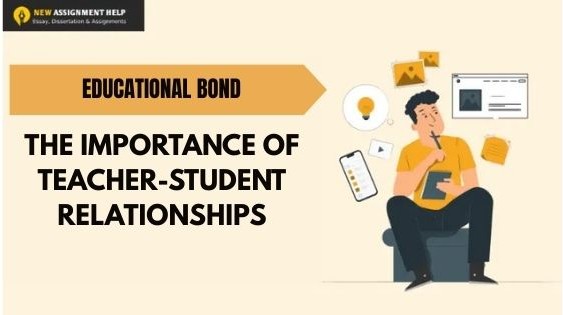Fostering Growth Beyond the Books: Why Teacher Student Relationships are Crucial
Think back to that one teacher who made you feel heard, understood you and whose classes you didn't wish to skip. The one whose presence made you happy and made the school a place worth looking forward to. We all have had such instances in our lives, and that stems from just one thing. A well cultivated teacher student relationship. It's those fun moments that the teacher brings, their presence lighting up your dull academic life. Yet beyond just the fun, it also signifies students' trust in the teacher, brings better engagement and results in students' success.
Today, we are looking at why such teacher student bonding matters. And why both students and teachers should aim to foster such a connection.
Why Teacher Student Relationships Matter
So, why is there a need for a deeper and more understanding teacher student connection? After all, the school and learning institutions have been following the traditional ways for years now. So why change that? The reasons for this are many, and we will look at them individually to understand why teacher student relationships matter.
1. Sense of belonging
Now, traditionally, the academic outcomes depended on students' attendance, their learning and their efforts. That still hasn't changed. However, what has changed is their mentality and the nature of learning. Students nowadays require more than just the teacher's order. They want someone who understands their goals, their ideals and helps them fulfil them. Teachers, on the other hand, want the same. They want their pupils to understand their expectations and try to fulfil them.
This can be done in an easy manner with a well nurtured bond between the teacher and their students. The teacher will convey their support through more than just their words. They can add culturally meaningful content and real world contexts for students. This gives the students a clear purpose to their learning, giving them a sense of belonging. For teachers, such culturally responsive or reality based pedagogy (Emdin) fosters deeper connections.
2. Enhanced Academic Outcomes
Every teacher wants better academic performance from their students; similarly, the learners want a chance to do so. However, the traditional means of simply having the students attend classes, learn through application and motivating them sometimes don't work well enough now. Nowadays, the need lies in more psychological support. Many students who are stuck back from self doubt or lack of confidence need help in overcoming that.
Teachers can provide that through their well fostered connection. They need to convey their high expectations and support to the students consciously. Students understand that their support will actively participate in clarifying their doubts and asking questions, and being supportive both ways. When students feel supported and understood, they're more likely to engage in their learning process, ask questions, and ultimately, perform better academically.
3. Boosted Self esteem and Confidence
Emotional traumas, self esteem issues and lack of confidence, most of these stem from a student's academic days. However, a well thought out classroom environment can resolve such worries. Many times, the students from an under resourced environment find it hard to voice their doubts. They feel concerned about their environment and end up spending their day troubled and with worse self esteem. Teachers can notice such conditions and create a positive environment where every student finds their voice.
This is true for the teachers, too. For many times, their confidence can be affected by their students' behaviour. In such conditions, they could turn into bigger concerns. For such conditions, a good student teacher bond would benefit them too. It would reduce their stress, giving them mental clarity and motivating them to put more effort too.
4. Modelling Growth Mindset & Grit
Most students nowadays run after grades, which is fair. However, in their pursuit of better results, they forget about their mentality and end up deeply affected by the results. In case those results don't match their expectations, it would be even worse.
Growth shouldn't come just in the academic or physical form. It should also showcase the mentality of the learners. Teachers can help mould their students' mindset to approach growth as the key indicator instead of the results. This will transform the students' result oriented mentality to that of grit, where the success or failure wouldn't impact it.
However, doing so requires teachers to share their own past vulnerabilities and how they overcame them. They would have to showcase the same grit, resilience and openness to failure. This wouldn't be possible without a strong bond between students and teachers. This provides another reason why such a connection between them is necessary for students' well being.
5. Mentorship & Lifelong Learning Skills
Lastly, the biggest reason as to why the teacher student relationships matter is the lifelong learning benefits of the same. For most students, their days in school are only made memorable by their memories. And a teacher who helped them develop a strong adaptability and critical thinking skill is one core memory.
A well fostered bond between the teacher and student is more than just an exchange of knowledge and teachings. It's a mentorship that allows for lifelong learning among the participants. Just like the concept of Archetypal pedagogy, where the teaching is considered a spiritual, transformative relationship for both teacher and student. It affects them both, giving a clear chance at lifelong learning.
Teachers' Role: Tools to Forge Connection
Now understand the reasons as to why a teacher student relationship matters, it's time to understand the practical methods on how teachers can do it. Here we have listed a few methods you can follow:
Create Psychological Safety in the Classroom
According to the Harvard Centre on the Developing Child, safety in relationships is foundational to cognitive and social development. This process can begin directly in the classroom with simple steps. Make eye contact with students, call out their names at the door, and greet them. Explicitly state that trying is what matters in your class, instead of just results.
Practice SEL methods
Social and emotional methods are as necessary as any other academic learning goal. However, there's a catch. Students don't just develop these skills alone. They look at their environment, and that defines their SEL growth. So it's a teacher's job to showcase a strong social and emotional presence and help develop the same for students. So it's necessary to practice SEL methods. Show empathy, be patient, and give examples of how to deal with varying scenarios. Such as narrating your emotional process in an annoying situation,” I'm frustrated, so I'll take a deep breath and then reply.” Such practices prove highly useful for students.
Invite Student Voice & Reciprocal Participation
Help students understand that their voice and opinions matter in the classroom. In the teacher student relationship, their ideals and reasons also decide your motives. Invite the students to voice their concerns, their doubts, and motivate others to participate too. You can even do a weekly ask your doubts section to prompt students to voice their thoughts.
Give Specific, Growth Oriented Feedback
Generic motivational quotes or feedback like “Good work” don't work or are simply not enough. Students need more specific feedback, which would showcase the teacher's actual interest towards their learning. So, note down the individual problem of your student and give relevant feedback to them.
Students' Role: Co Creating Strong Bonds
Of course, in a teacher student relationship, the teacher can't be the only one putting in their efforts. Students have to reciprocate with equal vigour to showcase that they understand their teacher's intention. To do so is actually not difficult either. Simply do a few things:
A . Engage Proactively
Students have to engage proactively in the activities or tasks planned by their teacher. Whether it be a class debate or a doubt solving session, bring your own findings and show them to your teacher.
B. Communicate Authentically
Communication is vital in education and the student teacher relationship. Don't wait for your concerns to be resolved on their own. If you have any doubts, communicate them directly to your teacher. Give them a clear chance to assist you.
C. Take Ownership
Without personal efforts, both the assistance and communication are redundant. So set clear goals for yourself, try to complete them and when stuck, have the teacher resolve your doubts. Ask the teacher about their learning path, use that to create your own plans and follow them thoroughly.
Challenges & Misconceptions to be mindful of
All things aside, maintaining a teacher student relationship is a highly difficult task. There are both practical and psychological challenges involved in doing so, even if for students' well being. Some common challenges and misconceptions involved in this endeavour are listed here:
- Time constraints are a big challenge for the teachers. Whether it be about giving the doubt solving sessions or resolving students' concerns, each of them is are highly time consuming endeavour.
- There is a misconception that having a good teacher student relationship means being a student's friend. You don't need to be their friend, just their mentor who is present when they are troubled. As long as such misconceptions can be overcome, the education could be made easier for students.
- Every teacher and student has to be mindful of their limits. Teachers should watch out for their students becoming overly reliant or blurring roles between them. However, it's easy to misunderstand the dynamics, hence the trouble.
Conclusion
Traditionally, the bond between a teacher and a student was just that of a respected mentor. The teacher teaches, and students follow. However, such traditional methods have proven equally harsh when it comes to the changing nature and reach of students. So now more than ever, there is a need for a better teacher student relationship, based on mutual respect and understanding of their interests. At New Assignment Help UK, our writers believe that only through collaborative efforts can the best results be obtained. And this guide aimed to explain exactly that to the students.
For both the students and the teachers, this relationship can bring positive results. Do you remember any teacher who guided you and made your academic life worth enjoying? Well then mention about in the comments below. And keep a lookout for the next guide we bring you.



